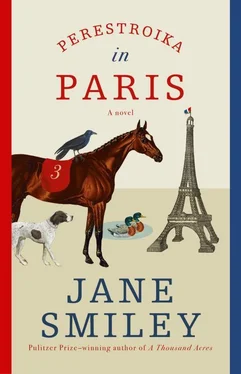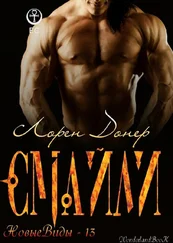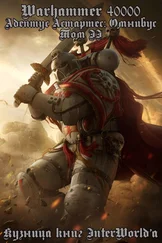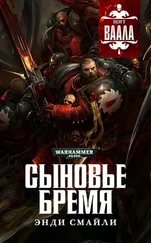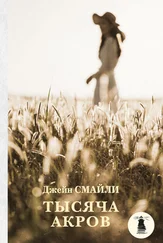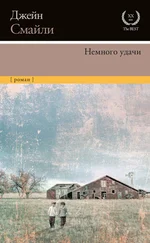Madame shifted her feet, and her toe touched him, but lightly. He moved over one step. More chitchat from above. Madame always spoke softly; Kurt found it soothing. Now another chair moved, and, moments later, the boy sat down. Kurt was surrounded by feet. The boy had taken off his boots at the door—Kurt could see them and smell them from where he was; they were the most exciting things in the room, fragrant with dirt and flowers and horse dung and a dozen other things that Kurt should be able to recognize but could not, because of his housebound lifestyle. The socks were fragrant, too, and a little grimy. Kurt crept over and peeked into the cuff of the boy’s trousers. There was the bud of a flower there, tiny. Kurt extracted it with a flick of his paw and tasted it. Bitter. He spat it out. Above him, more chitchat. He got bolder. He went back to Madame. There was fluff on the toe of her slipper—nothing to eat, but he flicked it away, then scratched at her slipper to see if it might give off an odor. It did not. He was getting very bold! Now the chairs pushed back, the humans stood up, and Kurt could see by the arrangement of their feet that the boy was helping the old lady out of the cuisine. He waited, then skittered to the doorway. She was going to her chair in the grand salon. She sat down, still talking, and picked up her knitting. It was the only thing Kurt ever saw her do in the house besides eat and sleep.
She kept talking, but the boy turned and came back toward the cuisine. Step by step down the corridor. Kurt didn’t move. The boy got closer. His gaze was on Kurt, right on him, and Kurt did not look away, but he did start to tremble, he did start to feel the tunnel entrance drawing him, he did start to wonder where Conrad was, and to long for that safe darkness. He squeaked, and then squeaked again. The boy squatted down in front of him and stretched out his hands, palms upward. Even a rat knew what palms upward meant—it meant “give me something.”
All was quiet, except for the comforting mumble of Madame counting her stitches. Kurt swallowed.
The boy smiled.
Rats do not smile, but they do open their eyes wide and make a little “o” with their mouths when they mean to be friendly.
The hands were still extended. Kurt crept forward. It was possible, Kurt thought, that the boy was the one who was essential to all of his hopes and dreams. He was right at the hands now. He touched one of them with his nose, and then flicked his whiskers across it. He put his paw on the hand. And then he went up into the hands, which were slightly cupped but did not curve around him, did not grasp him. After a moment, he coiled himself, and then the boy stood.
That time before, when the boy had tickled his belly and then his back, Kurt hadn’t been brave enough to look the boy in the eye. He had looked at the ceiling of the bedroom, where the light coming through the window seemed to be a part of that piercing noise that he now knew was a whinny that came and went and came and went and then was gone. The boy had been polite, Kurt had been polite, but then he had left, and that, it seemed, had been that. Now he uncurled himself, and sat up, looked at the boy, eye to eye, a difficult thing for a rat. His whiskers fluttered. He stopped them. He tried to be dignified but friendly-looking. The boy said, “I forgot how silky your fur is. Indeed, you are handsome.”
Kurt smoothed his whiskers with his paw. No one had ever called him handsome before. Perhaps that boded well for his reproductive aspirations.
Kurt didn’t know what he wanted from Étienne. Certainly not food. Perhaps this was enough—acceptance. When your own father went on and on about the injustice of rats’ being outcasts all over the world, about how every rat had a story of escaping the trap, or the broom, or the dropping shoe, a story of being greeted by screaming, by barking, by hissing, by a fog of ill-smelling and sickening gas, then acceptance was the oddest thing of all. He no longer had to look at the horse and ask himself, “Why do humans like horses, but not rats?” When he told Conrad about the dog saving him, Conrad had snorted in disbelief, said, “Must not have been hungry, then.” Here was something he would not do—tell Conrad about sitting in the boy’s hands. The boy bent down and set Kurt on the floor, then tickled his back for a few moments. Kurt walked in a leisurely manner, but, he felt, with a certain grace, to the entrance of his tunnel. It was broad day now, time for a nap. But he would return.

JÉRÔME CONSIDERED himself taciturn. He loved vegetables, he loved his neighborhood, he kept his eyes open, he knew it was not his job to gossip about his customers. Now that the dog always accompanied the boy and the old old lady to the shop, he felt that his original instinct, that the dog had been ferrying provisions to that household all along, was proved correct (as were most of his instincts). In this neighborhood, he had seen plenty over the years, and a man walking down the street on Monday with his arm around the waist of a pretty blonde and then walking down the street on Tuesday, laughing convivially with an elegant brunette, was the least of it. A shopkeeper in the Seventh Arrondissement was wise to keep his opinions to himself, and Jérôme always did so. But, nevertheless, there he had been, on a Saturday morning, talking about the boy and the dog and the old lady to Hélène, from the meat market next door, his hands under his apron, Hélène having a smoke, out on the street as if they lived in some village in the country, and, yes, Jérôme had been aware of someone in the shop behind him, but he’d thought she was squeezing oranges or selecting potatoes.
On Monday, late in the afternoon, this woman came to him with someone else, a man. It turned out that they were from the elementary school up the street. They came into the shop and more or less pinned Jérôme to the wall behind the cash register. It was true that Jérôme himself had not had a happy school experience—he had been a little wild, had hated studying, and excelled only in cultivating the school vegetable garden, which had been fine with his father, who had owned this shop before Jérôme did. They were polite enough, but that air of strictness that all teachers had would come out. Who was this boy? Jérôme had called him “Étienne” and had said that he appeared to be eight or nine. There was no boy at the school named “Étienne” other than a boy in the first grade. Jérôme had been talking about a boy he saw in the neighborhood with some frequency. Did he live in the neighborhood? How long had he been coming to the shop? What was this about a very old lady, maybe a hundred years old?
Jérôme said he knew nothing about the boy or where he lived or went to school. Strictly speaking, this was true, he knew nothing if you did not count the boy’s gustatorial preferences. Jérôme put the officials off. Let them look for the boy, let them spy on his shop and follow the boy home—that was their business, not Jérôme’s. But he did wonder how to warn that boy that something was in the wind.
Which was the reason that, the next time Étienne came home from Jérôme’s shop, he found, folded up among the dried figs he had bought as a treat (for himself and for Kurt and Paras), a note letting him know that some people from the school were nosing around for information about him. Jérôme’s handwriting was neat; even so, Étienne read the note three times before he comprehended what it meant. It meant that he had to come up with a plan before those people found him, before they found his great-grandmama. Before they found the horse. He made himself put the vegetables away, but he saw that his hands were trembling as he did so.
Читать дальше
